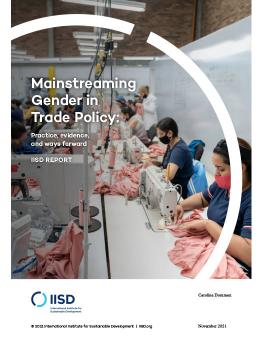
Mainstreaming Gender in Trade Policy: Practice, evidence, and ways forward
Gender-related provisions are becoming more and more common in trade agreements. But to what extent do they help —or hinder —efforts to achieve gender equality? This report analyzes the success of existing provisions to help maximize the impacts of future agreements.
Trade must be inclusive to contribute to sustainable development. This means there must be equal opportunities for women to benefit from trade, and women should not be more adversely impacted by trade or trade-related policies.
There is a growing willingness to “mainstream” concerns about trade’s gendered impacts in trade agreements. As these mainstreaming efforts gather momentum, it is useful to take stock of how well existing provisions on gender and trade contribute to gender equality. Defining metrics against which to gauge whether trade agreements are meeting gender equality objectives will enable us to identify and suggest ways to design gender-responsive measures for future agreements.
As such, this report analyzes different types of gender-related provisions in trade agreements. It proposes a gender equality framework to evaluate these provisions to ensure trade is gender responsive. It also describes mechanisms for anticipating the effects of planned trade agreements on women.
The report concludes by asking how our knowledge of the differential impacts of trade on women and men is—and can be—reflected in trade agreements in such a way as to promote inclusive trade, gender equality, and sustainable development.
You might also be interested in
Agreement on Climate Change, Trade and Sustainability: A landmark pact for trade and sustainability
The ACCTS pact, signed by Costa Rica, Iceland, New Zealand, and Switzerland, aligns trade and environmental policies, tackling fossil fuel subsidies, eco-labels, and green trade.
Addressing Carbon Leakage: A toolkit
As countries adopt ambitious climate policies, this toolkit examines strategies to prevent carbon leakage—when production and emissions shift to nations with weaker climate policies—and explores the trade-offs of each approach.
IISD Trade and Sustainability Review, December 2024
This edition of the IISD Trade and Sustainability Review presents four expert perspectives on how agricultural support and subsidies can promote sustainability in developing and least developed countries.
Why Trade Matters in the Plastic–Pollution Treaty Negotiations
The global push to end plastic pollution by 2040 highlights the critical intersection of trade and environmental action, with upcoming INC-5 negotiations focusing on reducing plastic production, consumption, and waste within a fair and effective international framework.